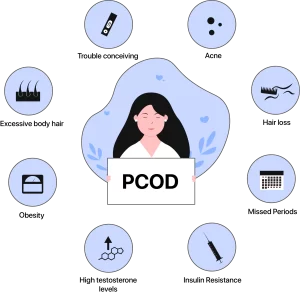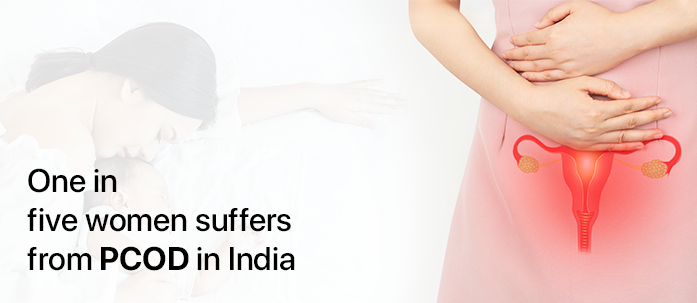What’s PCOD??
What is the difference between PCOS and PCOD?
Is this condition reversible?
How can PCOD/PCOS be diagnosed?
Dear women, are these questions haunting you? This article focuses on providing you with all the answers.
Let us start with the first question, what’s PCOD?
PCOD or polycystic ovarian disorder primarily results from the absence of the menstrual cycle. Each month our ovaries release many different types of hormones to regulate the menstrual cycle. In addition to female hormones, testosterone (known as a male hormone) is secreted, but in a very small amount. PCOD is caused when this little amount goes out of hand — leading to the formation of cysts. Some statistics show that in India, 1 in every 5 women suffer from PCOD, accounting for 22% of women. But still, there’s no detailed understanding of how the condition is triggered.
We can’t call PCOD a single disease but a set of disorders that affect each woman differently with varied symptoms. How many times have women you felt frustrated for no reason, cried for no reason, and felt depressed for no reason at all? Get yourself checked today; it might be your cyster’s eggs calling!
What is the difference between PCOS and PCOD?
Yes, PCOD and PCOS (Polycystic ovarian syndrome) are two different medical conditions affecting the ovaries, but here’s the catch they do have similar symptoms —
- Irregular or no periods
- Unwanted male-pattern hair growth on a woman’s chest, face, and lower back
- Depression
- Acne
- Fat deposition on the belly region
- Thinning of scalp hair
In PCOD, the ovaries produce many partially mature eggs; with proper medication, it can be managed. However, in PCOS, the ovaries stop releasing eggs; hence, considered to be more damaging because it leads to infertility and other medical complications like heart diseases, high blood pressure, type 2 diabetes, and endometrial cancer in later stages. So, seeking physician help as early as possible is highly advisable.

Is this condition reversible?
PCOD/PCOS can’t be reversed but can be controlled. Like diabetes, PCOD is also a lifestyle disorder but the cause is unclear. Studies have shown it gets triggered by a sedentary lifestyle, stress, and obesity leading to hormonal imbalance. Excessive smoking and drinking may also be one of the reasons for PCOD and PCOS.
Procedure for PCOD diagnosis?
Understanding PCOD condition is a bit tricky task; that’s why it is always better to seek medical help and get diagnosed as early as possible. Few patients show symptoms like irregular periods, acne weight gain, etc., but there are few cases when the patient is unaware of their condition because they undergo normal menstrual cycles. And later it gets diagnosed because of fertility issues. Here at yoda, we believe in quick and effective diagnosis and offer same-day results, so get yourself checked in case of any symptoms.
PCOD/PCOS medical diagnosis majorly consists of
- Pelvic ultrasound: Ultrasound is required to check the size of the ovaries, the lining of the uterus, and cysts in the ovaries, it also indicates the presence of any cancerous growth.
-
- Blood tests: To understand the hormonal levels blood test is done. It gives an understanding of cholesterol levels, blood glucose levels, lipid profiling, and also thyroid hormone levels.
Apart from this, the doctor may also ask about your medical history and eating/drinking habits. You might as well be screened for anxiety and depression and obstructive sleep apnea (OSA).
How to deal with PCOD?
Ladies, there are no direct ways to deal with PCOD / PCOS conditions as the symptoms are majorly exclusive. But we all can make some lifestyle modifications to control future complications. As it mainly affects the body’s hormonal balance, the following points may help to keep your “androgens” in check,
- Maintain your weight: Don’t cross your BMI. The range of 18.5 – to 25 is considered ideal and healthy for females. Maintaining a healthy body weight helps control cholesterol levels, high blood pressure, and diabetes by maintaining ideal insulin levels. Normal BMI controls androgen levels, which helps restore the menstrual cycle’s ovulation phase.
- Mindful eating: No sugar! Yeah, you heard it right simple carbs like sugar will worsen the conditions. Try eating complex carbs that help in maintaining insulin levels. Include fish, meat, eggs, and vegetables in your diet. Studies have shown natural fats like sunflower seeds, pumpkin seeds, sesame seeds, and butter helps to reduce that extra inch.
- Do regular exercise: If you have PCOD or PCOS, doing regular exercise will help in regulating blood sugar levels and will also keep your weight under control.
Yoda suggests
Surviving PCOD is a journey, and the most significant complication it comes with is infertility. Sometimes its diagnosis is complicated; unskilled technician makes matter worst. So, don’t take unnecessary birth control pills without any prescription, and get in touch with your doctor if you have infertility issues. Yoda provides a comprehensive panel for PCOD diagnosis and skilled technician that helps in early diagnosis and treatment.






















